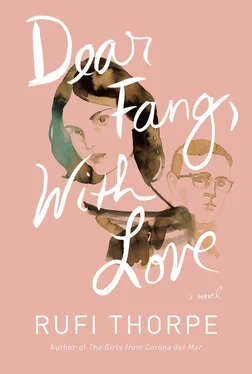But there I was, about to write a dissertation on it. Literary critics had been making their careers off psychology’s castoffs for ages. Freud’s understanding of the subconscious and symbolism was used constantly in literature classes as a way of teaching students how to interpret the “dream” of the text. He was always presented as a formative thinker of the twentieth century, but when I met a psychology PhD one night in a bar, he laughed in my face. “Why on earth would they teach you Freud?” he asked. “He was just plain wrong about, well, everything.” So in a way, it didn’t matter that theory of mind had lost its scientific validity, and yet it did matter, at least to me.
Woolf was an obvious candidate for talking about theory of mind because of her use of narrative embedding — her characters were constantly inferring, guessing, even narrating the thoughts of others. Her point of view was notoriously unstable, blurring between consciousnesses even as she technically focalized on just one character. But mind reading wasn’t just a technical aspect of her work, it was one of her most central themes: the simultaneous possibility and impossibility of knowing another person.
All of it made me think of Vera’s question to me on the plane, about the little men inside her, about the possibility of the self as a swarm or a hive instead of an “I.” In particular, I was thinking of these lines from To the Lighthouse, where Lily Briscoe wonders the exact same thing: “How, then, she had asked herself, did one know one thing or another thing about people, sealed as they were? Only like a bee, drawn by some sweetness or sharpness in the air intangible to touch or taste, one haunted the dome-shaped hive, ranged the wastes of the air over the countries of the world alone, and then haunted the hives with their murmurs and their stirrings; the hives, which were people.” It was the quote I had used as the epigraph for my dissertation.
I looked at my daughter that morning, the hive of her, drinking her coffee, tapping away at the keyboard of her laptop. I thought of Woolf and those rocks in her pocket as she waded into the river because she simply couldn’t bear going mad again. The general critical agreement now was that she had suffered from bipolar. Maybe it was only now that I knew Vera wasn’t actually mentally ill that I was able to think this, but I thought that even if Vera had been mentally ill, even if she was still, her experiences were real to her and therefore knowable by me. She could tell me about them, and I could understand, even if her observations were about the blue light coming off of Fang’s skin. She should never, no matter what, be shut away or deemed un-understandable. No one should force her to stay in bed and drink nothing but milk, which was one of the ways they had attempted to treat Woolf’s madness.
Judith was also quietly writing at the table in a little black leather journal. Her gray hair stood out in a poof around her head. I thought of Judith’s stories about her husband. I had asked her what he was like, and she said, “He was like me. He was a boy version of me,” and then she smiled crookedly. She had followed him all over the world as he pursued his studies. They’d had two children together. She and her husband had understood each other perfectly enough that she thought he was part of her, the male version of her own self. And then he had died and left her alone to wander through the world, through Vilnius, getting lost in the winding streets, unsure how to unlock her own door or locate light switches.
Woolf was always so anxious about whether or not people could truly know each other, and I couldn’t help but think it was because people had treated her the way we had treated Vera. Judging her thoughts, trying to control her mind, without ever really doing any proper investigation. And ultimately, if Woolf had truly thought people were sealed away, trapped inside themselves, how could she have written at all? Weren’t her books and their characters with their dizzying interior lives proof that mind reading was possible? That as anxious as we were, the feat was right there, on the page, the dangerous crossing already accomplished?
The phone rang. At first none of us knew what it was; we had not registered that the apartment had a landline. It became apparent after several rings that there was a tan hotel-style phone sitting on one of the shelves in the kitchen. Buttons on it lit up when it rang.
“Should I answer it?” I asked.
“It could be the program,” Vera said, which was exactly what I dreaded. I worried it would be Johnny Depp, yelling at us for not attending the lecture. Who else would even know the number of a telephone we had not known we had? I decided to answer it.
It was a woman’s voice. “Labas,” she said.
“Labas,” I said, which was Lithuanian for hello.
“This is Justine,” the voice said, and I had no idea who Justine was.
“I think you have the wrong number.”
“The genealogist.”
“Oh, right, right.”
Vera got up and was hovering right behind me. “Who is it?” she hissed, but I waved her away.
“Something very peculiar has happened,” Justine said.
“Excuse me, what?”
“I am telling you that something very bizarre has happened.”
“Oh,” I said, “I see.” I had my back to Judith and Vera and so was facing the shelves, which I had not particularly examined before. There was a small ceramic statue of a toadstool, gleaming red.
“Your grandmother’s brother, Henryk, survived the war.”
“He did?”
“Yes, and he had a family, two girls and a boy. Here in Vilnius. They would be your aunts and uncles. And they have had families themselves.”
“You’re kidding,” I said, though I did not think she was joking. Justine was an almost severe and forbidding person to talk to.
“But getting back to the bizarre thing that has happened,” Justine said, catching me off-guard: I had thought Henryk surviving and remaining in Vilnius was the bizarre thing. “One of your cousins is my fiancé.”
“You’re kidding,” I said again, feeling instantly like an idiot.
Vera was up out of her chair and tugging on my sleeve. “What is going on!” she whisper-screamed. I blindly waggled my hand behind me to force her away, never taking my eyes off the bright red toadstool. Obviously I would tell her everything when I got off the phone, but Justine had a very quiet voice and a slight accent and I had to pay a lot of attention to hear what she was saying.
“His name is Henryk, too, actually, though he goes by Herkus,” Justine said. “Anyway, when I discovered this, I hope you do not mind, but I told Herkus. And he would like very much to meet you.”
“That’s amazing!” I shouted, and I felt a sudden ripple of joy. But why? I had no specific, conscious desire to have cousins, and yet at the idea of cousins I found I was ecstatic.
“Great. We will meet you at the reading tonight. We can all have a drink,” she said.
“The reading?”
“Nikolai Azarin reads tonight,” Justine said.
“Right, right, great, we’ll be there,” I said, and hung up the phone.
Vera exploded, “What IS IT?”
I told her the news, doing a quick recap for Judith. I was careful not to mention the rape when I told of Grandma Sylvia’s escape, and it occurred to me that I had created a precarious situation by telling Justine about the rape birthday when I had been keeping it a secret from Vera. I doubted it would come up, but it bothered me. A loose end.
“How wonderful for you,” Judith said. “This certainly will be interesting.”
But Vera seemed slightly disappointed with the news. Or maybe she was still just grouchy from our strange fight the night before.
Читать дальше












